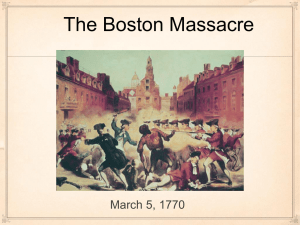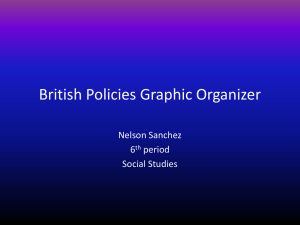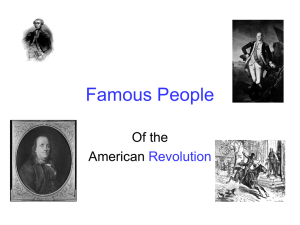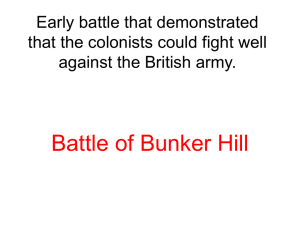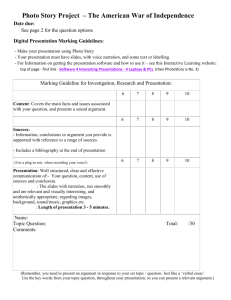Chapters 10 * 13 Social Studies Study Guide * Revolutionary War
advertisement
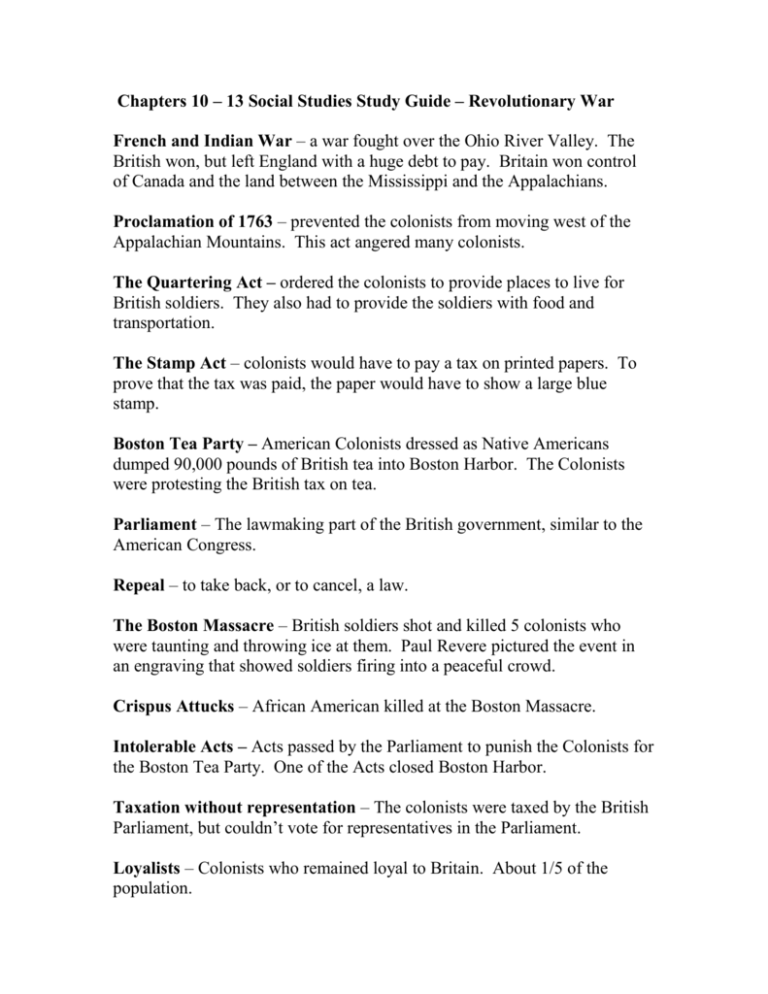
Chapters 10 – 13 Social Studies Study Guide – Revolutionary War French and Indian War – a war fought over the Ohio River Valley. The British won, but left England with a huge debt to pay. Britain won control of Canada and the land between the Mississippi and the Appalachians. Proclamation of 1763 – prevented the colonists from moving west of the Appalachian Mountains. This act angered many colonists. The Quartering Act – ordered the colonists to provide places to live for British soldiers. They also had to provide the soldiers with food and transportation. The Stamp Act – colonists would have to pay a tax on printed papers. To prove that the tax was paid, the paper would have to show a large blue stamp. Boston Tea Party – American Colonists dressed as Native Americans dumped 90,000 pounds of British tea into Boston Harbor. The Colonists were protesting the British tax on tea. Parliament – The lawmaking part of the British government, similar to the American Congress. Repeal – to take back, or to cancel, a law. The Boston Massacre – British soldiers shot and killed 5 colonists who were taunting and throwing ice at them. Paul Revere pictured the event in an engraving that showed soldiers firing into a peaceful crowd. Crispus Attucks – African American killed at the Boston Massacre. Intolerable Acts – Acts passed by the Parliament to punish the Colonists for the Boston Tea Party. One of the Acts closed Boston Harbor. Taxation without representation – The colonists were taxed by the British Parliament, but couldn’t vote for representatives in the Parliament. Loyalists – Colonists who remained loyal to Britain. About 1/5 of the population. Patriots – Colonists who wanted independence from Britain. About 2/5 of the population. They were angry about British taxes on tea and cloth. Neutralists – Colonists that did not take sides. About 2/5 of the population. Samuel Adams – organized a group of patriots called the Sons of Liberty. Militia – a small army made up of ordinary citizens. Common Sense – book written by Thomas Paine that convinced many colonists to declare independence. Over 120,000 copies were made, making it the most printed book in America up to that time. Paul Revere – warned the people of Massachusetts that the “British were coming” during his famous midnight ride. Lexington and Concord (April 19th 1775) – the first battle of the Revolutionary War. The first shot of this battle became known as “the shot heard round the world.” Battle of Bunker Hill – The Americans rally under the cry “Don’t fire until you see the whites of their eyes.” Mercenaries – soldiers hired to fight in another countries war. Hessians – German mercenaries who fought for the British Continental Congress – became the government for the American revolutionaries. The delegates had to decide how to fight the war and whether to declare independence from Britain. Treason – the crime of disloyalty toward a ruler or government. Thomas Jefferson – wrote the first draft of the Declaration of Independence. He later became the 3rd President of the United States of America. Marquis de Lafayette - young Frenchman who helped General Washington during the Revolutionary War. Named Independence Hall. Declaration of Independence – explained why the colonists wanted to be a separate nation and break away from Britain. Congress approved on July 4th, 1776. Stated that “all men are created equal” and that they have the rights of life, liberty, and the pursuit of happiness. John Hancock – was the first to sign the Declaration of Independence in bold large letters. Volunteers – people who freely perform a service. The Continental Army was made up of volunteers. John Paul Jones - American naval captain who sunk many British ships. He is famous for saying “I have not yet begun to fight!” Benedict Arnold – was an American general who gave secrets to the British. He is considered a traitor. George Washington – leader of the continental Army. Later became the 1st president of the United States. Chairman of the Constitutional Convention. British Army – made up of professional soldiers. There were about 45,000 soldiers in the British Army. Valley Forge– Washington’s army camped in the winter of 1777-1778 here. They emerged has a well trained army from the harsh and cold conditions. Benjamin Franklin – ambassador to France during the Revolutionary War. He convinced the French to support the American cause. Was a member of the committee to draft the Declaration of Independence. Molly Pitcher – helped fight by manning the cannons during the battle of Monmouth. Battle of Yorktown – (1781) the Americans and French forces win a decisive battle over the British. It is the last great battle of the war. Treaty of Paris – (1783) Britain agreed to recognize the United States as an independent nation. Britain also gave the U.S. a large amount of land.
